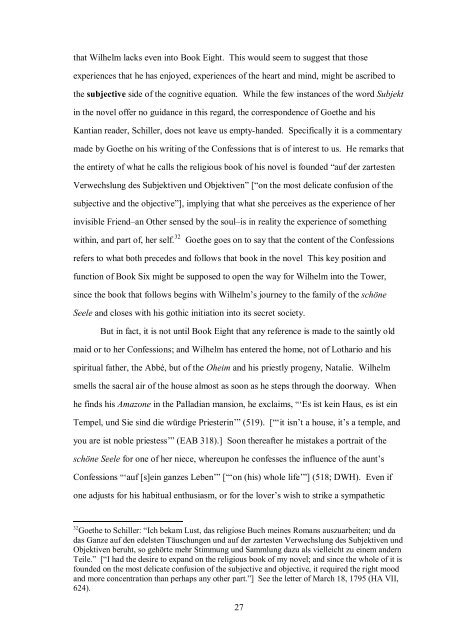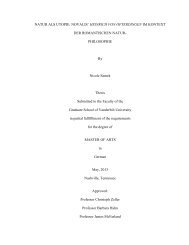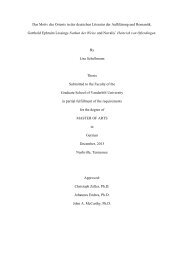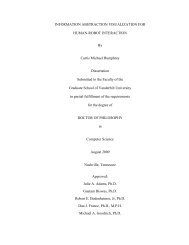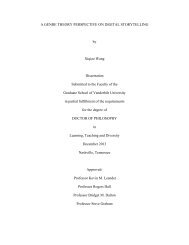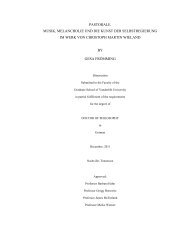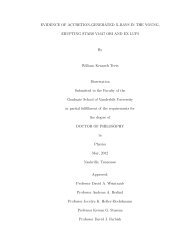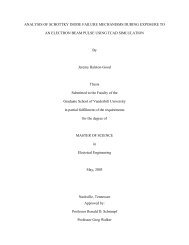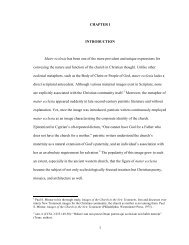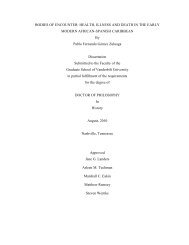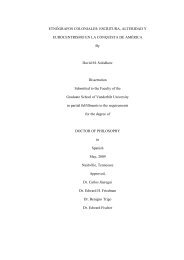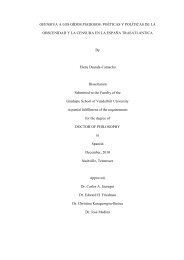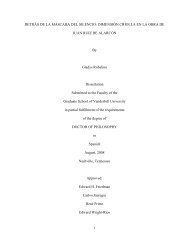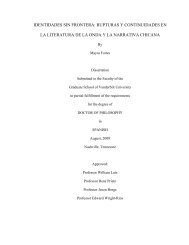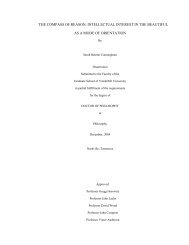THE DEATH OF DIONYSOS - ETD - Vanderbilt University
THE DEATH OF DIONYSOS - ETD - Vanderbilt University
THE DEATH OF DIONYSOS - ETD - Vanderbilt University
You also want an ePaper? Increase the reach of your titles
YUMPU automatically turns print PDFs into web optimized ePapers that Google loves.
that Wilhelm lacks even into Book Eight. This would seem to suggest that those<br />
experiences that he has enjoyed, experiences of the heart and mind, might be ascribed to<br />
the subjective side of the cognitive equation. While the few instances of the word Subjekt<br />
in the novel offer no guidance in this regard, the correspondence of Goethe and his<br />
Kantian reader, Schiller, does not leave us empty-handed. Specifically it is a commentary<br />
made by Goethe on his writing of the Confessions that is of interest to us. He remarks that<br />
the entirety of what he calls the religious book of his novel is founded “auf der zartesten<br />
Verwechslung des Subjektiven und Objektiven” [“on the most delicate confusion of the<br />
subjective and the objective”], implying that what she perceives as the experience of her<br />
invisible Friend–an Other sensed by the soul–is in reality the experience of something<br />
within, and part of, her self. 32 Goethe goes on to say that the content of the Confessions<br />
refers to what both precedes and follows that book in the novel This key position and<br />
function of Book Six might be supposed to open the way for Wilhelm into the Tower,<br />
since the book that follows begins with Wilhelm’s journey to the family of the schöne<br />
Seele and closes with his gothic initiation into its secret society.<br />
But in fact, it is not until Book Eight that any reference is made to the saintly old<br />
maid or to her Confessions; and Wilhelm has entered the home, not of Lothario and his<br />
spiritual father, the Abbé, but of the Oheim and his priestly progeny, Natalie. Wilhelm<br />
smells the sacral air of the house almost as soon as he steps through the doorway. When<br />
he finds his Amazone in the Palladian mansion, he exclaims, “‘Es ist kein Haus, es ist ein<br />
Tempel, und Sie sind die würdige Priesterin’” (519). [“‘it isn’t a house, it’s a temple, and<br />
you are ist noble priestess’” (EAB 318).] Soon thereafter he mistakes a portrait of the<br />
schöne Seele for one of her niece, whereupon he confesses the influence of the aunt’s<br />
Confessions “‘auf [s]ein ganzes Leben’” [“‘on (his) whole life’”] (518; DWH). Even if<br />
one adjusts for his habitual enthusiasm, or for the lover’s wish to strike a sympathetic<br />
32 Goethe to Schiller: “Ich bekam Lust, das religiose Buch meines Romans auszuarbeiten; und da<br />
das Ganze auf den edelsten Täuschungen und auf der zartesten Verwechslung des Subjektiven und<br />
Objektiven beruht, so gehörte mehr Stimmung und Sammlung dazu als vielleicht zu einem andern<br />
Teile.” [“I had the desire to expand on the religious book of my novel; and since the whole of it is<br />
founded on the most delicate confusion of the subjective and objective, it required the right mood<br />
and more concentration than perhaps any other part.”] See the letter of March 18, 1795 (HA VII,<br />
624).<br />
27


